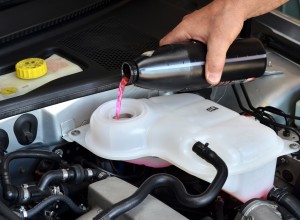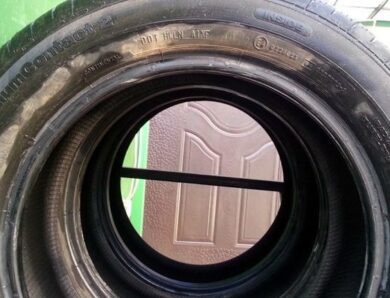Demining of the engine: why is she?
Structurally, the car has a developed electrical system, in which the serviceability and accuracy of the controllers depends on the mass, various sensors and many other electrical devices. Electric table (minus) is closed from the accumulator on a car body. The body is conditionally a return wire, forming a closed electric circuit.
We also recommend reading the article about it, which battery to choose for diesel engine. In this article you will learn about the basic requirements for batteries for motors of this type.
The movement of electrons in the chain is initiated by the battery, and the body acts as a conductor of negative charge for return by means of the negative terminal. For this reason, the metal body of the car is called the car mass. Under the demining of the engine in this case should be understood as a number of improvements, which provide additional connection of the most powerful consumers of the electric power in the car to weight.
Why do a warm-up
In the course of operation of a car it is possible to face that, that the electrical onboard network literally "sags", especially at peak loads (simultaneous inclusion of dimensions, low and high beam headlights, different heating mirrors and windows in parallel with the use of air conditioning, electric windows, powerful acoustics and other devices).
Also, "failures" in tension can be observed for no apparent reason, affecting the stability of the internal combustion engine, its ignition system, ECU, sensors, servo drives and other electrical appliances. This can happen in that case, if oxidation has occurred in the place of regular fastening of the negative terminal to the body, the contact has broken or corrosion has occurred. The automobile electric network naturally starts to work unstable.
Given the above, the demining of the engine often rises in two main cases: if necessary, alternative installation of the negative terminal on the car body in order to eliminate damage, as well as for modifications and tuning of the engine.
In the first case, additional demining of the motor is often needed because of that, that the car body is old, the regular place of fastening of weight has become unusable, etc.. P. Regarding improvements and tuning, there is an opinion about that, that additional demining allows to distribute electricity more evenly in the onboard network of the vehicle in comparison with use of the regular minus terminal.
Extra weight: advantages
Demining the engine in order to improve has both supporters, and opponents of this method. Skeptics consider this decision a waste of time and money, refer to that, that regular decisions in the car are quite enough, the cross section of the factory wires is enough, each sensor has its own negative ground (sensor ground) etc.. d.
The main argument among those, who has already implemented the procedure, there is stability of sparking and work of all ignition system as a result of the most effective and reliable weight in the car. It is also claimed, that the mass becomes equal for all devices, consuming electricity. Such a uniform distribution cannot be achieved by a standard mass, even with regular cleaning of the terminals. In the list of the main advantages of power warm-ups of the engine are noted:
- fuel economy at the minimum mark from 5-7% and more is achieved through it, unloading generator, resistance decreases;
- the starter rotates the crankshaft more actively at negative temperatures at the time of start;
- the engine after warming up works more smoothly and smoothly;
- the power plant responds better to the accelerator pedal;
- the motor gives more power;
- the battery lasts longer, it is more effective to recharge from the generator;
- vibrations of the engine disappear at inclusion of powerful consumers (air conditioning, increase the volume of music when using external amplifiers, etc.. d.);
We also recommend reading the article about it, how to properly store the battery. In this article you will learn about the basic requirements and recommendations for the preservation of car batteries.
This improvement makes it easier to start the car, the stability of turns in the idling mode increases (revs float). Also noted, that the headlights after warming up the diesel or petrol engine start to shine brighter, increasing the comfort and safety of movement in the dark. Additionally, it is worth noting, that after demining the obstacles and guidance are minimized or completely eliminated, music from media and radio in the car speaker system begins to play cleaner. Another plus is the increased safety for electrical equipment in that case, if the wire of the standard weight breaks or its fastening to a body collapses.
How to do a warm-up of the motor yourself
The procedure involves conducting additional wires to the ground from the main sources of current consumption. For most cars the minus is spent from 4-6 sources:
- minus the generator;
- weight from the starter;
- negative wire from the engine (preferably not less 2 points);
- gearbox weight (in the presence of automatic transmission);
- minus the body in the bonnet space (remote part of the battery);
For high-quality demining of the engine, special requirements must be taken into account.
- Wires must be flexible, made of high quality pure copper with minimal impurities. The use of wiring based on copper alloys is not recommended.
- Also, the wire must have a large cross section. This is necessary to ensure the best conductivity of electric current.
- Additionally, you will need to pay attention to the insulation of the wires. It must be strong, resistant to mechanical wear and have the ability to withstand significant temperature fluctuations (great heating in the hood space, followed by cooling).
It is worth adding, that can be purchased as ready-made solutions, and do a warm-up of the engine with your own hands. You will need a copper cable to make it, heat shrink tubing and terminals. The length of the cable and the number of terminals will depend on that, how many devices are planned to be grounded to the body (connect to ground). After cutting the cable it is necessary to crimp the terminals and put on heat shrink in those places, where the cable is exposed to connect to the terminal. The final stage will be the installation of manufactured wires in the hood space of the car.




